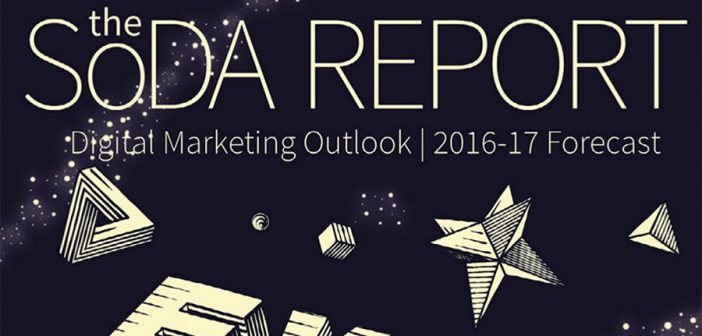Digital Budgets Rising As Fewer Clients Plan In-House Ad Capabilities
Despite a growing disconnect between clients and agencies on expectations and satisfaction, the agency model will thrive in the next 12 months as fewer clients say they plan to take digital marketing and advertising practices in-house this year–13%, down sharply from the 27% who said they would do so in 2015. That’s according to the Digital Outlook Study, part of The SoDA Report.
And in contrast to reports of clients paring their digital agency rosters, the number of clients with three or more digital shops on their roster grew 42% over the past year.
Market/marketing research by agencies was seen as their most valued skill by clients this year—in stark contrast to last year’s study when it was viewed as the least valued skill. The least valued skill this year is strategic leadership and marketing creativity, which adds fuel to the idea that clients are prioritizing execution over big ideas when it comes to agency relationships.
“There’s a positive outlook for agencies and clients and alike,” says Chris Buettner, editor of The SoDA Report. “With an eight-point increase in the number of marketers predicting spend increases, a trend toward digital agency specialization (despite recent media reports suggesting large-scale agency consolidation), and an acute need for innovation on the client side that is leading to more marketer-agency collaboration, the future is bright for forward-thinking digital shops.”
There was a lukewarm reaction to questions about client satisfaction on agency work. This year clients rated their satisfaction with each of the key services they buy from agencies. On a scale of one to five, not a single service scored better or worse than three.
Overall the digital agency/client relationship isn’t great with the number of agencies reporting “relationship improvements” falling from 70% to 53%.
Although the majority of agencies said changes in management was the number one reason to get fired (56%, up from 33% in 2015), clients say price or value is a primary reason they terminated a contract (37%).
Other reasons for changing agencies include displeasure over the creative (24%), mismatched agency size/ability (24%), unhappy with project management/account management (22%), unhappy with strategy (21%) and understaffed/under-experienced (21%). Cost over-runs, which were second in last year’s study, have fallen to eighth (13%).
More than half (55%) of clients expect to increase their digital spend, while only 11% forecast a fall, in the next 12 months. From an allocation perspective, focus on consumer experiences (websites, mobile web) is the top priority (82%) followed by content development (76%) and digital projects such as non-marketing related platforms, applications, tools and services (71%).
Twenty-seven percent of clients believe they are “very innovative” when it comes to digital marketing. This is expected to have a ripple effect throughout the marketing ecosystem as clients look for new partners for support innovation efforts.
Nearly half (47%) of agencies reported having an innovation lab or product incubator. These hubs have led to a number of direct impacts that include: significant revenue growth for the company (20%), talent retention (53%) contributed to new business wins (54%).
Still, there is a disconnect between agencies and clients when it comes to innovation. Agencies believe that clients are very weak in the areas of executive management (40%), user experience (42%), and technology (33%). Meanwhile, clients say their companies have little to no ground to make up in these areas.
Conducted in partnership with Forrester Research, the Digital Outlook Study is based on a global sample of 629 respondents, evenly split between advertisers and agencies with 86% at marketing director level or above and 30% in command of budgets in excess of $50 million. The report also features original articles by industry innovators, exclusive interviews with thought leaders, as well as case studies of several digital marketing campaigns.


